人教新目标(Go for it)版八年级下册 Unit 1 What's the matter? Section A (3a-4c) 课件 (共59张PPT)
文档属性
| 名称 | 人教新目标(Go for it)版八年级下册 Unit 1 What's the matter? Section A (3a-4c) 课件 (共59张PPT) | 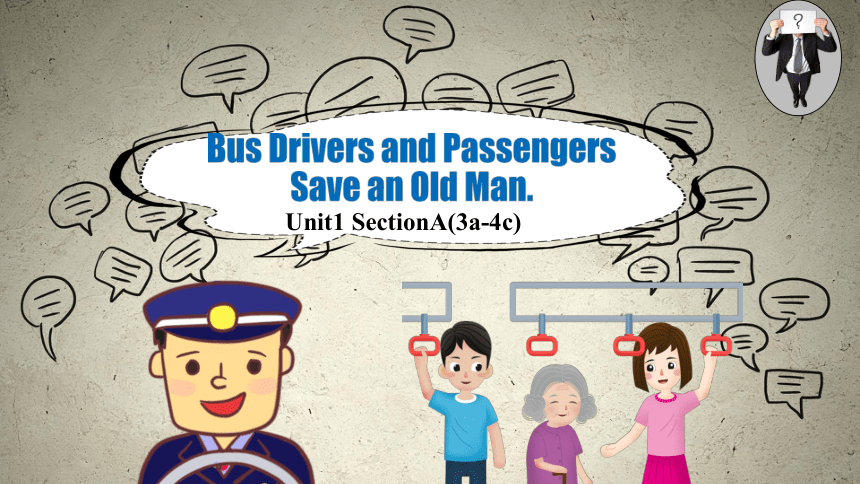 | |
| 格式 | pptx | ||
| 文件大小 | 112.0MB | ||
| 资源类型 | 教案 | ||
| 版本资源 | 人教新目标(Go for it)版 | ||
| 科目 | 英语 | ||
| 更新时间 | 2023-09-19 19:26:13 | ||
图片预览

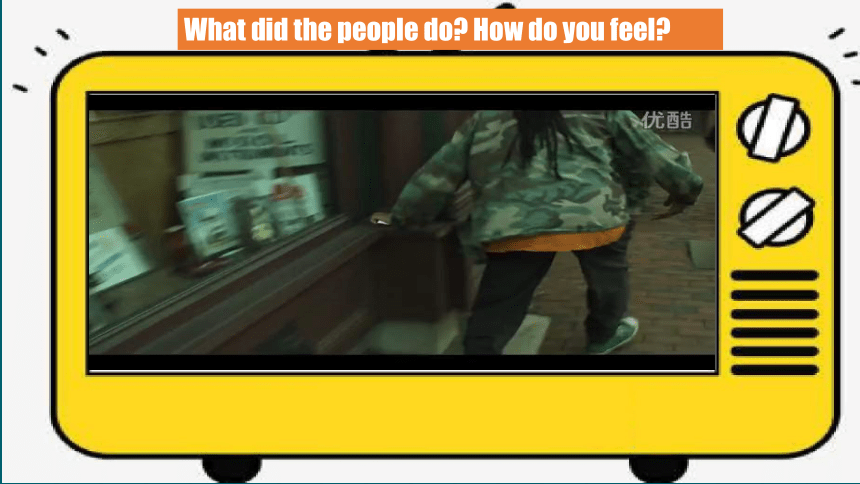
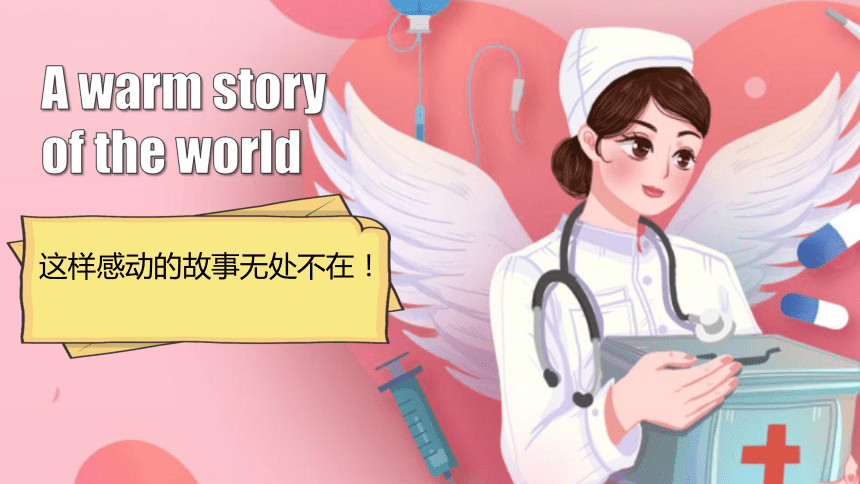
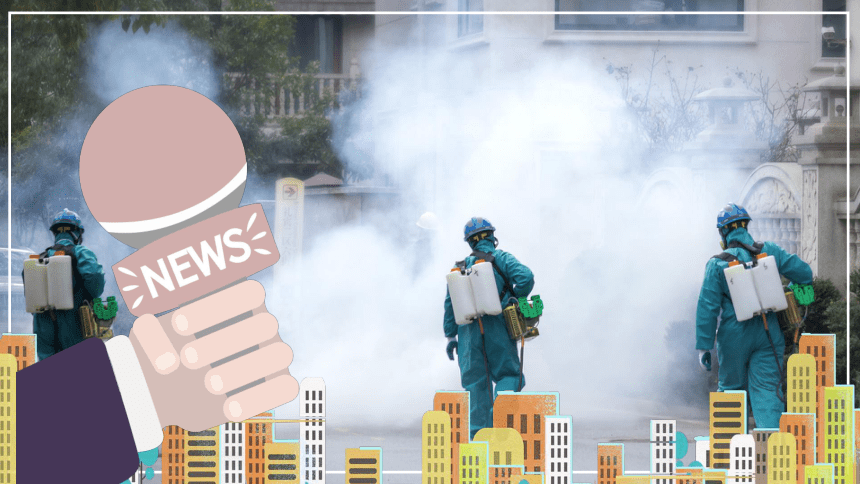



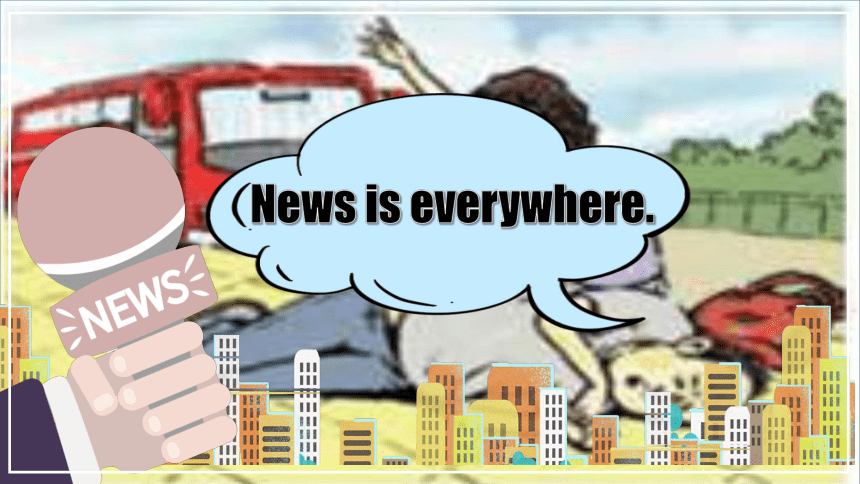
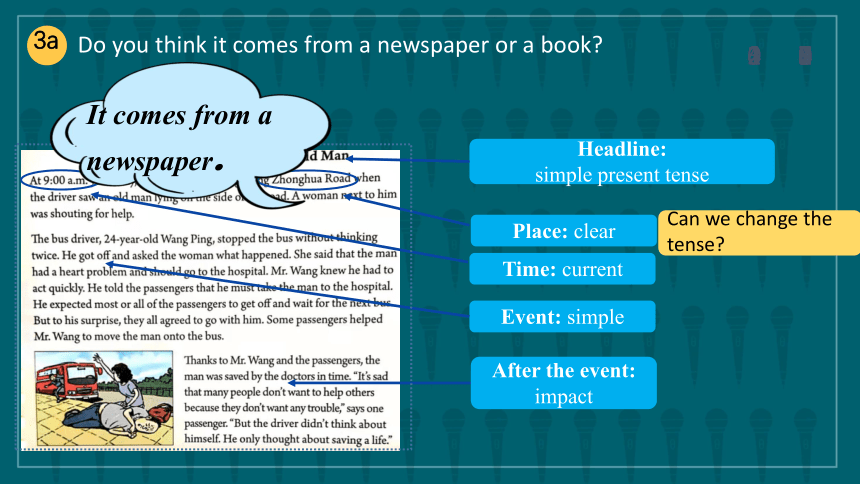
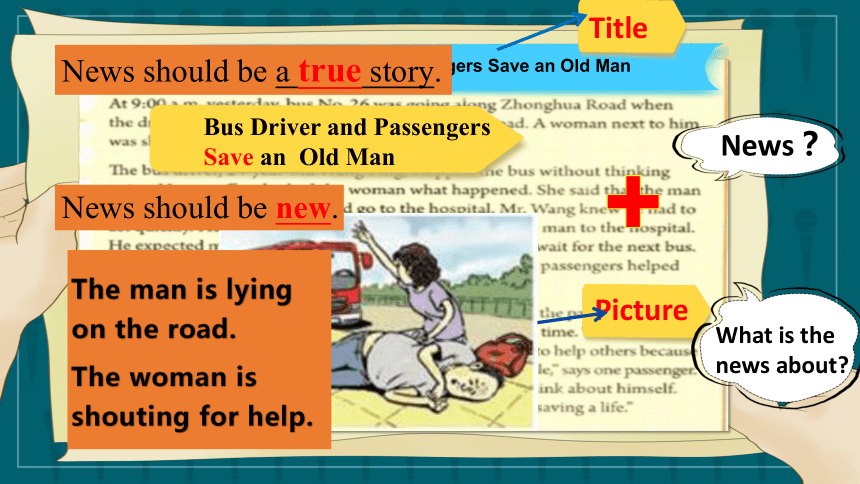

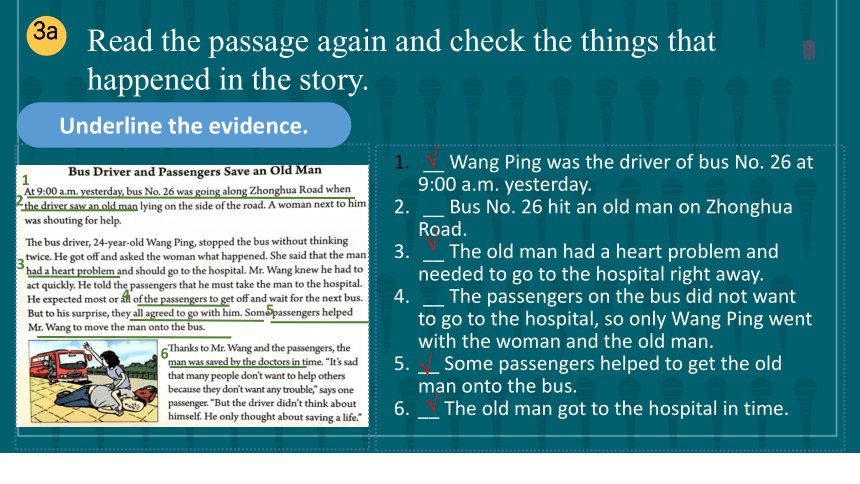
文档简介
(共59张PPT)
Bus Drivers and Passengers Save an Old Man.
Unit1 SectionA(3a-4c)
What did the people do How do you feel
A warm story
of the world
这样感动的故事无处不在!
News is everywhere.
3a
Do you think it comes from a newspaper or a book
Time: current
Place: clear
Headline:
simple present tense
Event: simple
After the event: impact
Can we change the tense
4
3
2
8
7
6
5
1
0
9
3
0
1
2
4
8
7
6
5
9
3
0
1
It comes from a newspaper.
Bus Driver and Passengers Save an Old Man
Title
Picture
What is the news about
News?
News should be a true story.
News should be new.
Bus Driver and Passengers Save an Old Man
The man is lying on the road.
The woman is shouting for help.
What was the result of the story
How people saved the old man
What the bus driver saw
Skimming and finding the main ideas of each paragraph.
Para.1
Para.2
Para.3
3a
5
3a
Read the passage again and check the things that happened in the story.
__ Wang Ping was the driver of bus No. 26 at 9:00 a.m. yesterday.
__ Bus No. 26 hit an old man on Zhonghua Road.
__ The old man had a heart problem and needed to go to the hospital right away.
__ The passengers on the bus did not want to go to the hospital, so only Wang Ping went with the woman and the old man.
__ Some passengers helped to get the old man onto the bus.
__ The old man got to the hospital in time.
Underline the evidence.
8
7
6
5
9
3
0
1
2
4
8
7
6
5
9
3
0
1
√
√
√
√
1
2
3
4
5
6
Careful reading:read Para. one for detailed information
At 9:00 a.m. yesterday, bus No.26 was going along Zhonghua Road when the driver saw an old man lying on the side of the road. A woman next to him was shouting for help.
(Lead导语---important information)
When
When
At 9:00 a.m. yesterday
Where
Who
What
Zhonghua Road
A bus driver, an old man and a woman
The driver saw an old man lying on the side of the road. A woman next to him was shouting for help.
Read Para. two for detailed information
The bus driver, 24-year-old Wang Ping, stopped the bus without thinking twice. He got off and asked the woman what happened. She said that the man had a heart problem and should go to the hospital. Mr. Wang knew he had to act quickly. He told the passagers that he must take the man to the hospital. He expected most or all of the passengers to get off and wait for the next bus. But to his surprise, they all agreed to go with him. Some passengers helped Mr. Wang to move the man onto the bus.
1. What's wrong with the old man
2. What was Wangping surprised
1. Some passengers helped the driver to move the man onto the bus.
2. The driver stopped the bus without thinking twice.
3. He expected some passengers to get off and wait for the next bus.
4. Passengers all agreed to go with him.
5. The driver got off and asked what happened.
2, 5, 3, 4, 1
Read para. 2 and put the sentences in correct order.
Read Para. two for detailed information
The bus driver, 24-year-old Wang Ping, stopped the bus without thinking twice. He got off and asked the woman what happened. She said that the man had a heart problem and should go to the hospital. Mr. Wang knew he had to act quickly. He told the passagers that he must take the man to the hospital. He expected most or all of the passengers to get off and wait for the next bus. But to his surprise, they all agreed to go with him. Some passengers helped Mr. Wang to move the man onto the bus.
How people saved the old man
take actions
Read Para. three for detailed information
Thanks to Mr. Wang and the
passengers, the man was saved by the doctors in time. ''It's said that many people don't want to help others because they don't want any trouble,'' says one passenger. ''But the driver didn't think about himself. He only thought about saving a life.''
What do you think of this driver?
A. He is kind and helpful.
B. He is serious and strict.
C. He is rude and strict.
D. He is kind and serious.
Read Para. three for detailed information
Thanks to Mr. Wang and the
passengers, the man was saved by the doctors in time. ''It's said that many people don't want to help others because they don't want any trouble,'' says one passenger. ''But the driver didn't think about himself. He only thought about saving a life.''
Did the passengers think Wangping did the right thing How do you know
Time for discussion
Thanks to Mr. Wang and the
passengers, the man was saved by the doctors in time. ''It's said that many people don't want to help others because they don't want any trouble,'' says one passenger. ''But the driver didn't think about himself. He only thought about saving a life.''
Do you agree that people do not help others because they do not want to get into trouble Why
or why not
Let's watch a piece of news.
Which side are you on
Summary
We need to help others indeed.
At the same time, we should help them in a right way.
Structure
Bus Driver and Passengers Save an Old Man
事情的起因
(Para. 1)
at 9:00 a.m. yesterday
Zhonghua Road
the driver: saw an old man
lying on the side of the road
a woman: was shouting for
help
事情的经过
(Para. 2)
the driver: stopped--- got off---
asked the woman---told the
passengers---took the man to
the hospital
the woman: said that the man
had a heart problem and should
go to the hospital
the passengers: agreed to go;
helped Mr. Wang to move the
man onto the bus
事情的结果
(Para. 3)
the man: was saved by doctors in time
the driver: didn't think about himself; only thought about saving a life
Wang Ping, a bus driver, was going along Zhonghua Road _______he saw an old man ______ on the side of the road and a woman next to him shouting for help. He stopped the bus without _____________. He ________and asked the woman what happened. She said that the man had a heart _________ and ________ go to the hospital. Wang Ping told the passengers that he must _______ the man to the hospital. He expected the passengers to get off and__________ the next bus. But _____________, they all helped him move the man _______ the bus. __________ these people, the man was saved in time.
Retell the passage
when
lying
thinking twice
got off
problem
should
take
wait for
to his surprise
onto
Thanks to
Let's
listen
&
repeat.
Key phrases
看到一个老人躺在路
的一边
2. 紧挨着他的一个妇女
3. 呼喊救命
4. 没有权衡利弊
5. 下车
6. 有心脏病
7. 带他去医院
8. 期望乘客们下车
9. 等下一趟公车
10. 令他惊讶的是
11. 搬那个人上了车
12. 多亏了
13. 及时
14. 考虑他自己
15. 考虑挽救一个生命
Language points
1. ...bus No. 26 was going along Zhonghua Road
when the driver saw an old man lying on the side
of the road.
......26路公交车正行驶在中华路上,这时司机看到一位老人躺在路边。
1. When 引导 ______ 从句?
2. 你能看出“看到某人正在做某事”的句
型吗?
3. was going 是什么结构?
lie
When: 引导时间状语从句,放在过去进行时构成的主句后,
表示某事正在进行时,另一件事情发生了。
1. ...bus No. 26 was going along Zhonghua Road
when the driver saw an old man lying on the side
of the road.
......26路公交车正行驶在中华路上,这时司机看到一位老人躺在路边。
见课本P81
was doing: 过去进行时
定义: 表示在过去某一时刻或某一时间内进行或发生的动作
形式: was/were+ V-ing
常与表示过去时间状语或者过去具体的时间点连用: at 9:00 a.m. yesterday
Eg: I was just getting into the shower when the telephone rang.
我正要冲澡,就在这个时候电话响了起来。
1. ...bus No. 26 was going along Zhonghua Road
when the driver saw an old man lying on the side
of the road.
......26路公交车正行驶在中华路上,这时司机看到一位老人躺在路边。
see sb. doing sth. 看见某人正在做某事或从事某种状态
see sb. do sth. 看见某人做某事,强调动作发生的全过程或经常发生。
Eg:I saw Tom playing chess with the old man.
(强调动作正在进行)
I saw Jim go into the bank just now.
(强调看到了动作发生的整个过程)
see sb. doing sth. 看见某人正在做某事或从事某种状态
see sb. do sth. 看见某人做某事,强调动作发生的全过程或经常发生。
1) 我看见他时他正在河边玩。
I saw him _______ by the river.
2) 我看见过他在河边玩。
I saw him _____ by the river.
3) 我看着他过了桥。
I see him ______ across the bridge.
4) 我看见她正在洗碗。
I see her _________ the dishes.
playing
play
walk
washing
2. The bus driver, 24-year-old Wang Ping, stopped
the bus without thinking twice.
3. He only thought about saving a life.
你能看出“without thinking”、“about saving a life” 的共同点吗
共同点:介词 + doing
介词 + 名词
宾格代词
doing
用适当的形式填空。
1) I am fine. What about ____ (she)
2) Thanks for ______ (tell) me the story
3) It is a sunny day. How about _____ (go) fishing
4) It is good to relax by ______ (use) the Internet
or _________ (watch) game shows.
5) People can't live without ________ (drink) water.
6) I am looking forward to ________ (travel) around
the world one day.
her
telling
going
using
watching
drinking
traveling
4. He expected most or all of the passengers to get off and wait for the next bus.
expect: v. 预料,预期
expect sb to do sth 期望某人做某事
1) I didn’t expect him to become a successful writer.
我没想到他会成为一个成功的作家。
2) Do you really expect me to believe you
你真的以为我会相信你吗
5. Thanks to Mr. Wang and the passengers, the man was saved by the doctors in time.
thanks to sb/sth “多亏;因为;由于”
1) Thanks to your help, we were successful.
由于你的帮助, 我们得以成功。
2) Thanks to the Internet, we can get the news around the
world quickly.
多亏了互联网,我们能快速地了解到世界各地的新闻。
thanks for(doing) sth. 意为“因(做) 某事而感谢你(们)。
Eg: Thanks for lending me your umbrella.
Grammar Focus
Have for
different meanings
1. 作“有”讲。 如:
I have a bag. 我有一个包。
He has a red cup. 他有一个红杯子。
2. 作“吃、喝”讲。如:
have breakfast (吃早饭) have tea (喝茶)
have a biscuit (吃块饼干) have a drink (喝点水)
3. 作“患病”讲。
have a cold, have a fever
4. 固定短语
have a try, have a look, have a party
本单元知识点,用have来讨论健康问题。
What's the matter I have a stomachache. You shouldn't eat so much next time.
What's the matter with Ben He hurt himself. He has a sore back. He should lie down and rest.
Do you have a fever Yes, I do./ No, I don't./I don't know. Does he have a toothache Yes, he does. He should see a dentist and get an X-ray.
What should she do She should take her temperature. Should I put some medicine on it Yes, you should./ No, you shouldn't. Grammar
Focus
本单元中have表示“患病”的意思。
Modal verbs should/shouldn’t
for suggestions
情态动词可以用来表示“提议”、“建议”或“请求”等。
情态动词should作“应该;应当;可以”讲,用以表达职责和义务、提出劝告,而且表述的是自己的主观看法,其后接动词原形。
should的否定形式是should not/ shouldn’t,意思是“不应当;不该”。
含有should的肯定句变一般疑问句时, 应将should提到句首:
She should take her temperature.
Should she take her temperature
肯定回答:Yes, 主语+should.
Yes,she should.
否定回答:No, 主语+shouldn’t.
No, she shouldn’t.
注意:should无人称、时态变化。 should + 动词原形
What's the matter I have a stomachache. You shouldn't eat so much next time.
What's the matter with Ben He hurt himself. He has a sore back. He should lie down and rest.
Do you have a fever Yes, I do./ No, I don't./I don't know. Does he have a toothache Yes, he does. He should see a dentist and get an X-ray.
What should she do She should take her temperature. Should I put some medicine on it Yes, you should./ No, you shouldn't. Grammar
Focus
should无人称、时态和数量的变化
情态动词后接动词原形!
Reflexive pronouns
反身代词
表示反射或强调的代词叫做反身代词。可译为“本人”、“本身”,也常译为“亲自”、“自己” 。其形式如下表:
人称 数 第一人称 第二人称 第三人称
单数
复数
myself
yourself
himself herself
itself
ourselves
yourselves
themselves
注意:反身代词跟在动词或者介词的后边;
反身代词可以作表语或者同位语。
判断句子:
1. Myself can finish my homework.
2. I’m drawing with myself crayons.
正确句子:
1. I myself can finish my homework. /
I can finish my homework myself.
2. I’m drawing with my own crayons.
What's the matter I have a stomachache. You shouldn't eat so much next time.
What's the matter with Ben He hurt himself. He has a sore back. He should lie down and rest.
Do you have a fever Yes, I do./ No, I don't./I don't know. Does he have a toothache Yes, he does. He should see a dentist and get an X-ray.
What should she do She should take her temperature. Should I put some medicine on it Yes, you should./ No, you shouldn't. Grammar
Focus
But the driver didn’t think about himself.
Help yourselves to the snacks and fruit.
She isn’t quite herself today.
She herself will fly to London tomorrow.
God help those who help themselves.
注意:反身代词跟在动词或者介词的后边;
反身代词可以作表语或者同位语。
判断句子:
Myself can finish my homework.
I’m drawing with myself crayons.
反身代词不能单独做主语,但可以做主语的同位语, 起强调作用。
I myself can finish my homework.
(I can finish my homework myself.)
注意:反身代词跟在动词或者介词的后边;
反身代词可以作表语或者同位语。
判断句子:
Myself can finish my homework.
I’m drawing with myself crayons.
反身代词表示“某人自己”,不能表示“某人的东西”,因为它没有所有格的形式。表达“某人自己的(东西)”时,须要用one’s own.
I’m drawing with my own crayons.
常见的搭配
照顾自己 look after oneself / take care of oneself
自学 teach oneself sth./ learn sth. by oneself
玩得高兴, 过得愉快 enjoy oneself
请自用……(随便吃/喝些……)help oneself to sth.
介绍自己 introduce oneself
沉浸于,陶醉于......之中 lose oneself
1. My classmate, Li Ming, made a card for _______ just now.
2. Bad luck! I cut _______ with a knife yesterday.
3. They tell us they can look after __________very well.
4. My cat can find food by _____.
5. Help __________ to some beef, boys.
6. Please introduce _________ first.
小试牛刀
himself
myself
themselves
myself
themselves
yourself
4a: Fill in the blanks and practice the conversation.
1. A: I hurt ______ when I played basketball yesterday. What _______ I do
B: You ______ see a doctor and get an X-ray.
2. A: _______ the matter
B: My sister and I ______ sore throats.
_______ we go to school
A: No, you _________.
myself
should
should
What’s
have
Should
shouldn't
3. A: _____ Mike _____ a fever
B: No, he ________. He _____ a stomachache.
A: He _______ drink some hot tea.
4a: Fill in the blanks and practice the conversation.
Does
have
doesn't
has
should
4b: Cicle the best advice for these helth problems. Then
add your own advice.
1. Jenny cut herself.
She should
(get an X-ray / put some medicine on the cut).
My advice: ______________________________.
2. Kate has a toothache.
She should
(see a dentist / get some sleep).
My advice: ________________________.
She should put a bandage on it
She shouldn’t eat cold food
4b: Cicle the best advice for these helth problems.
Then add your own advice.
3. Mary and Sue have colds.
They shouldn’t
(sleep/ exercise).
My advice: ______________________________.
4. Bob has a sore back.
He should
(lie down and rest / take his temperature).
My advice: ______________________.
They should drink more hot water
He should get an X-ray
Groupwork
One student mimes a problem. The other students in your group guess the problem and give advice.
Name Problem Advice
Liu Peng fall down go home and rest
A: What's the matter with you Did you hurt yourself playing soccer
B: No, I didn't.
C: Did you fall down
B: Yes, I did.
D: You should go home and get some rest.
Homework
be generous
in giving help
Be a warm person
Bus Drivers and Passengers Save an Old Man.
Unit1 SectionA(3a-4c)
What did the people do How do you feel
A warm story
of the world
这样感动的故事无处不在!
News is everywhere.
3a
Do you think it comes from a newspaper or a book
Time: current
Place: clear
Headline:
simple present tense
Event: simple
After the event: impact
Can we change the tense
4
3
2
8
7
6
5
1
0
9
3
0
1
2
4
8
7
6
5
9
3
0
1
It comes from a newspaper.
Bus Driver and Passengers Save an Old Man
Title
Picture
What is the news about
News?
News should be a true story.
News should be new.
Bus Driver and Passengers Save an Old Man
The man is lying on the road.
The woman is shouting for help.
What was the result of the story
How people saved the old man
What the bus driver saw
Skimming and finding the main ideas of each paragraph.
Para.1
Para.2
Para.3
3a
5
3a
Read the passage again and check the things that happened in the story.
__ Wang Ping was the driver of bus No. 26 at 9:00 a.m. yesterday.
__ Bus No. 26 hit an old man on Zhonghua Road.
__ The old man had a heart problem and needed to go to the hospital right away.
__ The passengers on the bus did not want to go to the hospital, so only Wang Ping went with the woman and the old man.
__ Some passengers helped to get the old man onto the bus.
__ The old man got to the hospital in time.
Underline the evidence.
8
7
6
5
9
3
0
1
2
4
8
7
6
5
9
3
0
1
√
√
√
√
1
2
3
4
5
6
Careful reading:read Para. one for detailed information
At 9:00 a.m. yesterday, bus No.26 was going along Zhonghua Road when the driver saw an old man lying on the side of the road. A woman next to him was shouting for help.
(Lead导语---important information)
When
When
At 9:00 a.m. yesterday
Where
Who
What
Zhonghua Road
A bus driver, an old man and a woman
The driver saw an old man lying on the side of the road. A woman next to him was shouting for help.
Read Para. two for detailed information
The bus driver, 24-year-old Wang Ping, stopped the bus without thinking twice. He got off and asked the woman what happened. She said that the man had a heart problem and should go to the hospital. Mr. Wang knew he had to act quickly. He told the passagers that he must take the man to the hospital. He expected most or all of the passengers to get off and wait for the next bus. But to his surprise, they all agreed to go with him. Some passengers helped Mr. Wang to move the man onto the bus.
1. What's wrong with the old man
2. What was Wangping surprised
1. Some passengers helped the driver to move the man onto the bus.
2. The driver stopped the bus without thinking twice.
3. He expected some passengers to get off and wait for the next bus.
4. Passengers all agreed to go with him.
5. The driver got off and asked what happened.
2, 5, 3, 4, 1
Read para. 2 and put the sentences in correct order.
Read Para. two for detailed information
The bus driver, 24-year-old Wang Ping, stopped the bus without thinking twice. He got off and asked the woman what happened. She said that the man had a heart problem and should go to the hospital. Mr. Wang knew he had to act quickly. He told the passagers that he must take the man to the hospital. He expected most or all of the passengers to get off and wait for the next bus. But to his surprise, they all agreed to go with him. Some passengers helped Mr. Wang to move the man onto the bus.
How people saved the old man
take actions
Read Para. three for detailed information
Thanks to Mr. Wang and the
passengers, the man was saved by the doctors in time. ''It's said that many people don't want to help others because they don't want any trouble,'' says one passenger. ''But the driver didn't think about himself. He only thought about saving a life.''
What do you think of this driver?
A. He is kind and helpful.
B. He is serious and strict.
C. He is rude and strict.
D. He is kind and serious.
Read Para. three for detailed information
Thanks to Mr. Wang and the
passengers, the man was saved by the doctors in time. ''It's said that many people don't want to help others because they don't want any trouble,'' says one passenger. ''But the driver didn't think about himself. He only thought about saving a life.''
Did the passengers think Wangping did the right thing How do you know
Time for discussion
Thanks to Mr. Wang and the
passengers, the man was saved by the doctors in time. ''It's said that many people don't want to help others because they don't want any trouble,'' says one passenger. ''But the driver didn't think about himself. He only thought about saving a life.''
Do you agree that people do not help others because they do not want to get into trouble Why
or why not
Let's watch a piece of news.
Which side are you on
Summary
We need to help others indeed.
At the same time, we should help them in a right way.
Structure
Bus Driver and Passengers Save an Old Man
事情的起因
(Para. 1)
at 9:00 a.m. yesterday
Zhonghua Road
the driver: saw an old man
lying on the side of the road
a woman: was shouting for
help
事情的经过
(Para. 2)
the driver: stopped--- got off---
asked the woman---told the
passengers---took the man to
the hospital
the woman: said that the man
had a heart problem and should
go to the hospital
the passengers: agreed to go;
helped Mr. Wang to move the
man onto the bus
事情的结果
(Para. 3)
the man: was saved by doctors in time
the driver: didn't think about himself; only thought about saving a life
Wang Ping, a bus driver, was going along Zhonghua Road _______he saw an old man ______ on the side of the road and a woman next to him shouting for help. He stopped the bus without _____________. He ________and asked the woman what happened. She said that the man had a heart _________ and ________ go to the hospital. Wang Ping told the passengers that he must _______ the man to the hospital. He expected the passengers to get off and__________ the next bus. But _____________, they all helped him move the man _______ the bus. __________ these people, the man was saved in time.
Retell the passage
when
lying
thinking twice
got off
problem
should
take
wait for
to his surprise
onto
Thanks to
Let's
listen
&
repeat.
Key phrases
看到一个老人躺在路
的一边
2. 紧挨着他的一个妇女
3. 呼喊救命
4. 没有权衡利弊
5. 下车
6. 有心脏病
7. 带他去医院
8. 期望乘客们下车
9. 等下一趟公车
10. 令他惊讶的是
11. 搬那个人上了车
12. 多亏了
13. 及时
14. 考虑他自己
15. 考虑挽救一个生命
Language points
1. ...bus No. 26 was going along Zhonghua Road
when the driver saw an old man lying on the side
of the road.
......26路公交车正行驶在中华路上,这时司机看到一位老人躺在路边。
1. When 引导 ______ 从句?
2. 你能看出“看到某人正在做某事”的句
型吗?
3. was going 是什么结构?
lie
When: 引导时间状语从句,放在过去进行时构成的主句后,
表示某事正在进行时,另一件事情发生了。
1. ...bus No. 26 was going along Zhonghua Road
when the driver saw an old man lying on the side
of the road.
......26路公交车正行驶在中华路上,这时司机看到一位老人躺在路边。
见课本P81
was doing: 过去进行时
定义: 表示在过去某一时刻或某一时间内进行或发生的动作
形式: was/were+ V-ing
常与表示过去时间状语或者过去具体的时间点连用: at 9:00 a.m. yesterday
Eg: I was just getting into the shower when the telephone rang.
我正要冲澡,就在这个时候电话响了起来。
1. ...bus No. 26 was going along Zhonghua Road
when the driver saw an old man lying on the side
of the road.
......26路公交车正行驶在中华路上,这时司机看到一位老人躺在路边。
see sb. doing sth. 看见某人正在做某事或从事某种状态
see sb. do sth. 看见某人做某事,强调动作发生的全过程或经常发生。
Eg:I saw Tom playing chess with the old man.
(强调动作正在进行)
I saw Jim go into the bank just now.
(强调看到了动作发生的整个过程)
see sb. doing sth. 看见某人正在做某事或从事某种状态
see sb. do sth. 看见某人做某事,强调动作发生的全过程或经常发生。
1) 我看见他时他正在河边玩。
I saw him _______ by the river.
2) 我看见过他在河边玩。
I saw him _____ by the river.
3) 我看着他过了桥。
I see him ______ across the bridge.
4) 我看见她正在洗碗。
I see her _________ the dishes.
playing
play
walk
washing
2. The bus driver, 24-year-old Wang Ping, stopped
the bus without thinking twice.
3. He only thought about saving a life.
你能看出“without thinking”、“about saving a life” 的共同点吗
共同点:介词 + doing
介词 + 名词
宾格代词
doing
用适当的形式填空。
1) I am fine. What about ____ (she)
2) Thanks for ______ (tell) me the story
3) It is a sunny day. How about _____ (go) fishing
4) It is good to relax by ______ (use) the Internet
or _________ (watch) game shows.
5) People can't live without ________ (drink) water.
6) I am looking forward to ________ (travel) around
the world one day.
her
telling
going
using
watching
drinking
traveling
4. He expected most or all of the passengers to get off and wait for the next bus.
expect: v. 预料,预期
expect sb to do sth 期望某人做某事
1) I didn’t expect him to become a successful writer.
我没想到他会成为一个成功的作家。
2) Do you really expect me to believe you
你真的以为我会相信你吗
5. Thanks to Mr. Wang and the passengers, the man was saved by the doctors in time.
thanks to sb/sth “多亏;因为;由于”
1) Thanks to your help, we were successful.
由于你的帮助, 我们得以成功。
2) Thanks to the Internet, we can get the news around the
world quickly.
多亏了互联网,我们能快速地了解到世界各地的新闻。
thanks for(doing) sth. 意为“因(做) 某事而感谢你(们)。
Eg: Thanks for lending me your umbrella.
Grammar Focus
Have for
different meanings
1. 作“有”讲。 如:
I have a bag. 我有一个包。
He has a red cup. 他有一个红杯子。
2. 作“吃、喝”讲。如:
have breakfast (吃早饭) have tea (喝茶)
have a biscuit (吃块饼干) have a drink (喝点水)
3. 作“患病”讲。
have a cold, have a fever
4. 固定短语
have a try, have a look, have a party
本单元知识点,用have来讨论健康问题。
What's the matter I have a stomachache. You shouldn't eat so much next time.
What's the matter with Ben He hurt himself. He has a sore back. He should lie down and rest.
Do you have a fever Yes, I do./ No, I don't./I don't know. Does he have a toothache Yes, he does. He should see a dentist and get an X-ray.
What should she do She should take her temperature. Should I put some medicine on it Yes, you should./ No, you shouldn't. Grammar
Focus
本单元中have表示“患病”的意思。
Modal verbs should/shouldn’t
for suggestions
情态动词可以用来表示“提议”、“建议”或“请求”等。
情态动词should作“应该;应当;可以”讲,用以表达职责和义务、提出劝告,而且表述的是自己的主观看法,其后接动词原形。
should的否定形式是should not/ shouldn’t,意思是“不应当;不该”。
含有should的肯定句变一般疑问句时, 应将should提到句首:
She should take her temperature.
Should she take her temperature
肯定回答:Yes, 主语+should.
Yes,she should.
否定回答:No, 主语+shouldn’t.
No, she shouldn’t.
注意:should无人称、时态变化。 should + 动词原形
What's the matter I have a stomachache. You shouldn't eat so much next time.
What's the matter with Ben He hurt himself. He has a sore back. He should lie down and rest.
Do you have a fever Yes, I do./ No, I don't./I don't know. Does he have a toothache Yes, he does. He should see a dentist and get an X-ray.
What should she do She should take her temperature. Should I put some medicine on it Yes, you should./ No, you shouldn't. Grammar
Focus
should无人称、时态和数量的变化
情态动词后接动词原形!
Reflexive pronouns
反身代词
表示反射或强调的代词叫做反身代词。可译为“本人”、“本身”,也常译为“亲自”、“自己” 。其形式如下表:
人称 数 第一人称 第二人称 第三人称
单数
复数
myself
yourself
himself herself
itself
ourselves
yourselves
themselves
注意:反身代词跟在动词或者介词的后边;
反身代词可以作表语或者同位语。
判断句子:
1. Myself can finish my homework.
2. I’m drawing with myself crayons.
正确句子:
1. I myself can finish my homework. /
I can finish my homework myself.
2. I’m drawing with my own crayons.
What's the matter I have a stomachache. You shouldn't eat so much next time.
What's the matter with Ben He hurt himself. He has a sore back. He should lie down and rest.
Do you have a fever Yes, I do./ No, I don't./I don't know. Does he have a toothache Yes, he does. He should see a dentist and get an X-ray.
What should she do She should take her temperature. Should I put some medicine on it Yes, you should./ No, you shouldn't. Grammar
Focus
But the driver didn’t think about himself.
Help yourselves to the snacks and fruit.
She isn’t quite herself today.
She herself will fly to London tomorrow.
God help those who help themselves.
注意:反身代词跟在动词或者介词的后边;
反身代词可以作表语或者同位语。
判断句子:
Myself can finish my homework.
I’m drawing with myself crayons.
反身代词不能单独做主语,但可以做主语的同位语, 起强调作用。
I myself can finish my homework.
(I can finish my homework myself.)
注意:反身代词跟在动词或者介词的后边;
反身代词可以作表语或者同位语。
判断句子:
Myself can finish my homework.
I’m drawing with myself crayons.
反身代词表示“某人自己”,不能表示“某人的东西”,因为它没有所有格的形式。表达“某人自己的(东西)”时,须要用one’s own.
I’m drawing with my own crayons.
常见的搭配
照顾自己 look after oneself / take care of oneself
自学 teach oneself sth./ learn sth. by oneself
玩得高兴, 过得愉快 enjoy oneself
请自用……(随便吃/喝些……)help oneself to sth.
介绍自己 introduce oneself
沉浸于,陶醉于......之中 lose oneself
1. My classmate, Li Ming, made a card for _______ just now.
2. Bad luck! I cut _______ with a knife yesterday.
3. They tell us they can look after __________very well.
4. My cat can find food by _____.
5. Help __________ to some beef, boys.
6. Please introduce _________ first.
小试牛刀
himself
myself
themselves
myself
themselves
yourself
4a: Fill in the blanks and practice the conversation.
1. A: I hurt ______ when I played basketball yesterday. What _______ I do
B: You ______ see a doctor and get an X-ray.
2. A: _______ the matter
B: My sister and I ______ sore throats.
_______ we go to school
A: No, you _________.
myself
should
should
What’s
have
Should
shouldn't
3. A: _____ Mike _____ a fever
B: No, he ________. He _____ a stomachache.
A: He _______ drink some hot tea.
4a: Fill in the blanks and practice the conversation.
Does
have
doesn't
has
should
4b: Cicle the best advice for these helth problems. Then
add your own advice.
1. Jenny cut herself.
She should
(get an X-ray / put some medicine on the cut).
My advice: ______________________________.
2. Kate has a toothache.
She should
(see a dentist / get some sleep).
My advice: ________________________.
She should put a bandage on it
She shouldn’t eat cold food
4b: Cicle the best advice for these helth problems.
Then add your own advice.
3. Mary and Sue have colds.
They shouldn’t
(sleep/ exercise).
My advice: ______________________________.
4. Bob has a sore back.
He should
(lie down and rest / take his temperature).
My advice: ______________________.
They should drink more hot water
He should get an X-ray
Groupwork
One student mimes a problem. The other students in your group guess the problem and give advice.
Name Problem Advice
Liu Peng fall down go home and rest
A: What's the matter with you Did you hurt yourself playing soccer
B: No, I didn't.
C: Did you fall down
B: Yes, I did.
D: You should go home and get some rest.
Homework
be generous
in giving help
Be a warm person
同课章节目录
- Unit 1 What's the matter?
- Section A
- Section B
- Unit 2 I'll help to clean up the city parks.
- Section A
- Section B
- Unit 3 Could you please clean your room?
- Section A
- Section B
- Unit 4 Why don't you talk to your parents?
- Section A
- Section B
- Unit 5 What were you doing when the rainstorm came
- Section A
- Section B
- Review of Units 1-5
- Unit 6 An old man tried to move the mountains.
- Section A
- Section B
- Unit 7 What's the highest mountain in the world?
- Section A
- Section B
- Unit 8 Have you read Treasure Island yet?
- Section A
- Section B
- Unit 9 Have you ever been to a museum?
- Section A
- Section B
- Unit 10 I've had this bike for three years.
- Section A
- Section B
